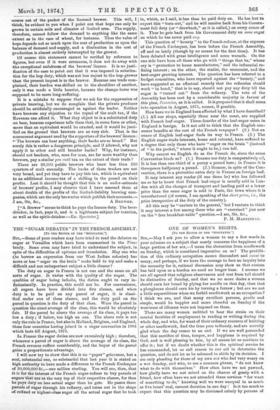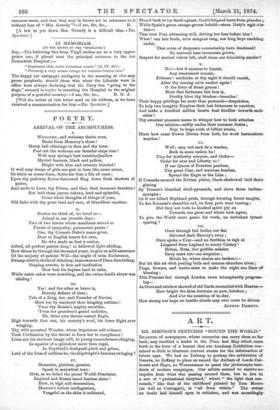ONE OF WOMEN'S RIGHTS. [To THE EDITOR OP THE "SPECTATOR.")
S1R,—May I ask you to allow a woman to say a few words in your columns on a subject that nearly concerns the happiness of a large portion of her sex,—I mean the abstention from needlework on Sunday, which is considered imperative on us? The prohibi- tion of this ordinary occupation causes discomfort and ennui to many, and perhaps, if we have the courage to face an inquiry into the necessity for it, rational discussion may show us that custom has laid upon us a burden we need no longer bear. I assume we are all agreed that religious observances and rest from toil should be distinctive of Sunday, and that we no more desire a woman should earn her bread by plying her needle on that day, than that a ploughman should earn his by turning a furrow ; but are we not a little superstitious when we forbid needlework as an occupation? I think we are, and that many excellent persons, gentle and simple, would be happier and more cheerful on Sunday if the weariness of idleness were not imposed on them.
There are many women unfitted to bear the strain on their mental faculties of employment in reading or writing during the whole day, and who, for want of their ordinary resource of knitting or other needlework, find the time pass tediously, and are secretly glad when the day comes to an end. If we are well persuaded that this sacrifice of time, temper, and happiness is required by God, and is well pleasing to him, by all means let us continue to offer it ; but if we doubt whether this is the spiritual service he has commanded, let us call reason to our aid to determine the question, and do not let us be ashamed to abide by its decision. I am only pleading for those of my own sex who feel very weary on a wet Sunday, and who, to use a common phrase, " do not know what to do with themselves." How often have we not yawned, how gladly have we not seized on the chance of gossip with a friend, how often have we not attended three services "for want of something to do," knowing well we were unequal to as much as five hours' real, earnest devotion in one day ! Is it too much to expect that this question may be discussed calmly by persons of
common-sense, and that they may in future act in reference to it without fear of " Mrs. Grundy "?—I am, Sir, &c., B. [A law to put down Mrs. Grundy is a difficult idea.—ED. Spectator.]







































 Previous page
Previous page